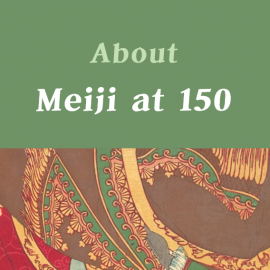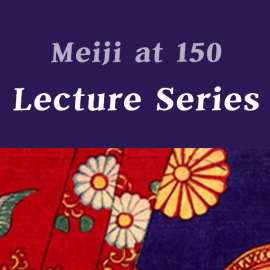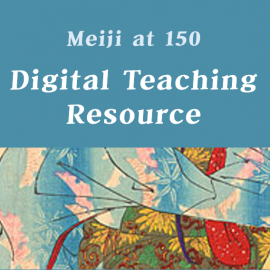Images Courtesy: UBC Rare Books and Special Collections, and the Museum of Anthropology
Meiji at 150 Project Videos
Dr. David Howell (Harvard University)
In this presentation, Dr. David Howell (Harvard University) argues that the night-soil economy of Edo offers a novel way to situate late Tokugawa and early Meiji Japan into the broader history of the nineteenth-century world, while at the same time challenging the tendency to essentialize the “greenness” of early modern Japanese cities.
Dr. Gideon Fujiwara (University of Lethbridge)
In this presentation, Dr. Gideon Fujiwara (University of Lethbridge) discusses the ritualization of the “Utakai Hajime” imperial poetry reading-ceremony and in the early Meiji Period. Within the context of nation-building programs carried out by the Meiji government, the inclusion of poems composed by civilians in the poetry ceremony represented an attempt to make the imperial family more visible to the people.
Dr. Marcia Yonemoto (University of Colorado-Boulder)
In this lecture, Dr. Marcia Yonemoto (University of Colorado-Boulder) details practices of male heir adoption during the Tokugawa period, and charts changes and continuities in adoption in the early Meiji Period. The desire to maintain family lineages and inheritance resulted in the prevalence of male heir adoption in early modern Japan relative to other societies around the world.
Dr. Shunya Yoshimi (University of Tokyo)
In this Meiji at 150 Project Keynote Lecture, Dr. Shunya Yoshimi (University of Tokyo, Harvard University) proposes that a longue durée approach to history presents one possible solution to the crisis of the humanities in Japan and North America. Noting cyclical trends in Japan’s recent history, Dr. Yoshimi calls attention to multiple “scales” of history in 25-year, 50-year, 75-year, 150-year, and even 500-year increments.
Sherri Kajiwara (Nikkei National Museum)
In this lecture, Sherri Kajiwara (Nikkei National Museum) traces the history of Japanese immigration to Canada and introduces several exhibits concerning the lived experiences of Japanese-Canadian internment and disposession in 1942 curated at the Nikkei National Museum.
Gendering War & Peace in Modern Japan Workshop
In this workshop, Dr. Barbara Molony (Santa Clara), Dr. Sabine Frühstück (UCSB), Dr. Sharalyn Orbaugh (UBC), and Dr. Hillary Maxson (Oregon) present their recent research and discuss the transwar positionality of women and children, resisting the tendency to see 1945 as a breakpoint and to instead analyze longer-term developments in years of both war and peace.
 Faculty of Art
Faculty of Art









